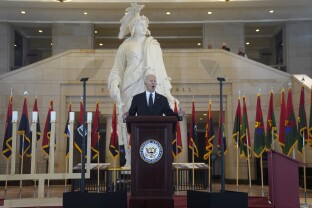After months of war and protest, President Joe Biden on Tuesday set about reframing the tense and emotional American debate over Israel and its war in Gaza. It’s just not clear who is listening.
The Biden campaign acknowledged the president’s Holocaust Remembrance Day speech would not quell future protests and said that wasn’t the intention.
“As long as there’s a war, activists, no matter where they are, are going to speak to what’s happening,” a campaign official said. “We’re attuned to the reality that people feel really passionate about this.”
The speech avoided most of the thorniest issues that have divided Democrats. The president didn’t mention the striking police response ordered by some school administrators to shut down anti-Israel protests, nor did he mention the growing signals that the war is expanding despite Biden’s own warnings.
Instead, Biden reemphasized his long-standing support for Israel, even as his administration takes the country’s government to task over how they are conducting the war in Gaza. Biden connected the rise in antisemitism with Hamas’ Oct. 7 attacks and said too many people are already forgetting the carnage. He said rhetoric from American protesters, particularly in and around college campuses, has veered into antisemitism and must be called out.
Biden said he has seen “a ferocious surge of antisemitism in America and around the world,” with “antisemitic posters, slogans, calling for the annihilation of Israel, the world’s only Jewish state.” In comments about the protests last week, Biden also condemned Islamophobia and racism directed at Arab Americans.
Some Democrats defended the absence of foreign policy. “Today, it was about antisemitism,” said Rep. Jared Moskowitz to reporters at the Capitol Tuesday. “It wasn’t about Israel.”
The current debate over American policy toward Israel is rooted in long-running political divisions that have been turbocharged by the Gaza war. The reactions to Biden’s speech existed within that split.
“I was blown away by how wonderful it was to hear President Biden’s remarks,” Lee Shaffer, Emory University Hillel campus director, told NOTUS. “This is what we needed to hear, and I believe that Biden’s administration is doing their best to lead the way in a very difficult political atmosphere.”
“Antisemitism should not be allowed,” said Abed Hammoud, a Dearborn, Michigan, attorney and longtime Democrat who won’t support Biden in November because of his policy toward Israel during the current war. “Should we also do a little more to stop the killing in Palestine as well? Let’s do these things hand in hand.”
Some Democrats and many Republicans think the public Democratic infighting could spell disaster for the Biden campaign in November. Democrats NOTUS spoke to in the lead-up to Biden’s speech pushed back, highlighting two polls released during the recent peak of the protest movement showing college students don’t rank Israel as a top issue.
Rep. Ro Khanna, the California progressive who recently posted a video with Wisconsin college students aimed at de-escalating campus vitriol over Israel, told NOTUS that Biden’s speech wasn’t about the campaign.
“I think he was just speaking from his heart against bigotry and antisemitism, and I think that’s what he did today,” he said. “I don’t think he was looking at the electoral consequences.”
Many other Democrats on Capitol Hill said they didn’t attend or pay attention to Biden’s remarks. About an hour and a half after Biden’s speech, NOTUS spoke to almost a dozen House members who said they hadn’t been plugged in.
Progressives who have criticized Biden’s handling of the conflict, like Reps. Pramila Jayapal and Greg Casar, said they hadn’t listened to or looked at Biden’s speech. A staffer for Rep. Rashida Tlaib said the same. Rep. Summer Lee said she “didn’t know it was happening.”
“There’s a lot of stuff to keep up with around here,” she said.
Pro-Israel Democrats were also tuned out, including Rep. Steny Hoyer, a staunch Biden ally, who said he hadn’t read the speech but nevertheless was confident in what he said because Biden has been “a very, very strong opponent of antisemitism and bigotry and hatred and prejudice, generally.”
The timing of Biden’s speech may still carry political upside. While the president was speaking at the Capitol, former President Donald Trump was sitting in court in New York listening to Stormy Daniels rehash the seamy details of her alleged relationship with Trump and his allies’ alleged efforts to prevent her from talking about it.
The Biden campaign official said the moment gave the president “a direct split screen.”
—
Evan McMorris-Santoro and Jasmine Wright are reporters at NOTUS. Tinashe Chingarande is a NOTUS reporter and an Allbritton Journalism Institute fellow.
Sign in
Log into your free account with your email. Don’t have one?
Check your email for a one-time code.
We sent a 4-digit code to . Enter the pin to confirm your account.
New code will be available in 1:00
Let’s try this again.
We encountered an error with the passcode sent to . Please reenter your email.


